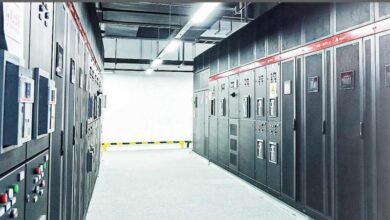UPS Systems: Power Backup for Critical Operations

Uninterrupted Power Supply (UPS) systems are critical for enterprises that need consistent access to electricity. These systems protect against power outages, ensuring that important activities can continue without interruption. UPS systems safeguard critical equipment and data against power fluctuations and outages in several industries, including healthcare, banking, and data centers. Businesses that do not have a dependable UPS system are at risk of system breakdowns, data corruption, and expensive downtime. This article will explain what UPS systems are, how important they are in reducing downtime, and how to choose the best UPS system for your business. Understanding the operation and important components of UPS systems can help you secure your company in the event of an unexpected power outage.
What Are UPS Systems and Why Are They Crucial for Critical Operations?
Definition and Function of UPS Systems
A UPS system is a device that supplies emergency power to connected loads when the primary power supply fails. It serves as a backup, ensuring that key functions continue uninterrupted. UPS systems function by storing energy in batteries or capacitors, enabling them to provide power for a limited time following an outage. UPS systems’ principal duty is to sustain power flow and enable a smooth shutdown of sensitive equipment. This is particularly important for businesses where power outages might cause data loss or equipment damage. A UPS guarantees that organizations can continue operating without interruption by providing a temporary power supply, therefore reducing the hazards connected with power outages.
How UPS Systems Prevent Data Loss and Downtime
UPS systems provide temporary power during outages, which helps to reduce data loss and downtime. They enable enterprises to continue operating uninterrupted until backup generators or main electricity are restored. In the case of a power outage, the UPS system automatically switches to battery power, allowing users enough time to save their work or gracefully shut down computers. This is especially crucial in areas requiring data integrity and system uptime, such as IT, healthcare, and finance. UPS systems avoid sudden shutdowns, reducing the danger of damaged information, system malfunctions, and productivity loss, ensuring that organizations have little disturbance during unexpected power outages.
See also: Supercharge Your Stock Trading with Stockity’s Innovative Technology
Key Components of a Typical UPS System
A typical UPS system is made up of a number of important components that work together to provide uninterrupted power during outages. The primary components are the rectifier, inverter, battery, and bypass switch. The rectifier transforms incoming alternating current (AC) electricity to direct current (DC) to charge the batteries. During an outage, the inverter turns stored DC power back into alternating current electricity for connected equipment. Batteries store energy and may offer backup power when required. The bypass switch guarantees that power continues to flow to devices even if the UPS system fails. These components work together to provide a consistent and dependable power supply, reducing downtime and safeguarding sensitive equipment from unexpected power outages.

How to Choose the Right UPS System for Your Business
Understanding Your Power Requirements
Understanding your business’s power requirements is the first step in selecting the correct UPS system. Consider the equipment you use and the electricity it requires. Calculate the total wattage of all devices to be connected to the UPS. This can help you calculate the size and capacity of the UPS you need. Consider how long you’ll need backup power. Businesses with high-power-demand equipment or locations with frequent power outages may need bigger, more powerful UPS systems. Assessing your individual power requirements allows you to choose a UPS that fulfills your operating demands without overpaying for unneeded capacity.
The Importance of Load Capacity and Runtime
When choosing a UPS system, it is critical to understand load capacity and runtime. The maximum power that a UPS system can give to connected equipment is known as load capacity, and it is often measured in watts or VA (volt-amperes). To prevent overloading, make sure the UPS’s capacity matches the overall power usage of your equipment. Runtime, on the other hand, refers to how long the UPS can offer backup power during an outage. A longer runtime allows vital processes to continue until a generator is engaged or the main power is restored. Consider both load capacity and runtime to guarantee that the UPS system can maintain your company during power outages without compromising performance.
Evaluating the Efficiency and Reliability of UPS Systems
The efficiency and dependability of a UPS system are critical aspects in selecting the best one for your organization. Efficiency relates to how well a UPS transfers electricity while reducing energy loss. A high-efficiency UPS system lowers energy usage and operational expenses over time. Reliability is also crucial since it defines how well the system functions under stress, such as during extended power outages or while managing several devices. Look for a UPS system with a strong track record of dependability and high-quality components. Consider systems with surge protection and overload warnings to keep your company safe and functioning during power outages.
Conclusion
Integrating a UPS system into your company operations is a critical step in protecting against power outages. These technologies save expensive downtime, safeguard critical equipment, and assure company continuity. Understanding the purpose, components, and selection criteria of UPS systems allows organizations to pick the best solution for their unique requirements. To guarantee optimum performance, consider aspects such as load capacity, runtime, efficiency, and dependability. With the correct UPS system in place, your company will be better prepared to deal with unexpected power outages, reducing data loss and downtime. Don’t underestimate the importance of having a reliable ups power backup system to safeguard your critical operations.







